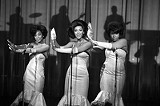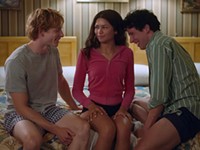[
{
"name": "500x250 Ad",
"insertPoint": "5",
"component": "15667920",
"parentWrapperClass": "",
"requiredCountToDisplay": "1"
}
]
No biz like show biz
Movies
Once one of Hollywood's greatest contributions to cinema, the movie musical now seems something of an oddity, rarer even than another grand American form, the Western. Aside from the cost of such productions and just possibly a dearth of talent --- no new Fred Astaire, Gene Kelly, Bob Fosse, Ginger Rogers, Cyd Charisse, or Gwen Verdon waits in the wings --- changing tastes in music may also contribute to that decline, so that any film with a significant musical content depends more on the past than the present, like the musical biographies of Cole Porter and Bobby Darin, or that remake of a remake, The Producers, all failures with both audiences and reviewers. The latest contribution to the tradition, itself a film version of a Broadway production, Dreamgirls closely resembles far too many of its predecessors in style, content, even inspiration to deserve all the superlatives that adorn the advertisements.
Though obviously inspired by the career of an actual singing group, the famous Supremes, and featuring a cast of talented black actors, Dreamgirls closely resembles scores of other musicals, most of them more original and more entertaining. Its story, its people, its music all look and sound completely familiar; in fact, I think most weary survivors of long nights in the resonant darkness of the movie houses could predict the general course of its action and the behavior of its people.
One in a long and practically unbroken line of show business musicals stretching back to the days of 42nd Street, the movie essentially weaves a string of clichés through a rich tapestry of spirited harmony. It begins with a talent contest at a theater in Detroit, where a trio of young amateurs called The Dreamettes catch the eye of an aspiring manager, a Cadillac salesman named Curtis Taylor (Jamie Foxx), who arranges for them to sing backup for an R & B singer, James "Thunder" Early (Eddie Murphy). The exuberant Jimmy Early, on the verge of the coveted "crossover" from soul records to the pop charts, comes on too strong for the sedate crowd at a Miami Beach hotel, but his backup trio charms them and, under Curtis' management, takes their first steps to success.
Now christened The Dreams, the three young women, Deena (Beyoncé Knowles), Effie (Jennifer Hudson), and Lorrell (Anika Noni Rose), embark on their own tour and begin to build a reputation. The quality of their sound, along with Curtis' payola, inspires disc jockeys to play their records on big-time radio stations, enabling them to make the crossover that eludes most ethnically marginalized musicians. To add a more widely marketable appearance, Curtis replaces the lead singer, the gifted, overweight, temperamental Effie, with Deena, who, though she lacks Effie's great big voice, is slim and beautiful, a demotion that leads to the dissolution of the trio's chemistry and a reinvention of their sound.
The story proceeds in the usual manner, with several montages of headlines, magazine covers, TV appearances, etc., showing The Dreams becoming international stars. At the same time, Effie, betrayed and alone, lives in poverty, nurses a terrible and entirely justifiable bitterness, and sings a couple of terrific, almost operatic solos. Increasingly the sinister, manipulative manager of screen legend, Curtis continues to wound people and destroy careers, following his belief that the music of The Dreams is not about art or sound or beauty but about money.
In the manner of old fashioned musicals, the characters often convert their important scenes into duets, articulating their feelings in the style of their performances. Those performances, which interrupt the action periodically, tend to lean heavily on glitter, stage effects, a throng of dancers, and overpowering orchestrations. They ultimately constitute a somewhat plodding series of rather bland and repetitive examples of three attractive young women dressed in stunning gowns, singing close harmony and moving in unison.
The actors, especially Eddie Murphy, perform with immense energy and some genuine emotional power. All the voices sound grand, especially Beyoncé Knowles, even lovelier than Diana Ross, upon whom her character is based. The great find of Dreamgirls, however, is Jennifer Hudson, whose big voice and powerful presence threaten to blow all her co-stars off the screen; she makes the picture worth watching (and hearing).
Dreamgirls(PG-13), written and directed by Bill Condon, is now playing at Culver Ridge 16, Pittsford, Henrietta 18, and Tinseltown.
Latest in Movie Reviews
More by George Grella
-

Film Review: "Cake"
Jan 26, 2015 -

Film Review: "American Sniper"
Jan 19, 2015 -

Film Review: "Inherent Vice"
Jan 12, 2015 - More »






